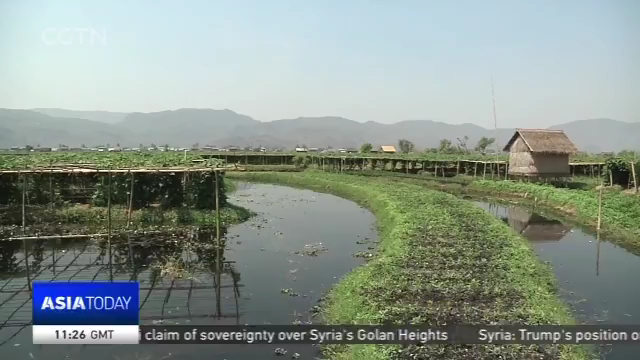
20:05, 22-Mar-2019
World Water Day: Pollution, deforestation takes a toll on Myanmar's Inle Lake
Updated
20:00, 25-Mar-2019
02:40

Today is World Water Day, and this year's theme is "Leaving no one behind". One of Myanmar's most well-known and beautiful places is in danger of dying. Pollution and deforestation are taking a toll on Inle Lake. Dave Grunebaum introduces us to a man who's doing his part to try to save it.
Inle Lake: Its scenery has made it one of Myanmar's most popular tourist attractions. Villages with homes built on stilts dot the lake. The majority of them belong to people from the Intha ethnic group. The lake is their lifeblood where they fish and farm on floating gardens of tomatoes, eggplants and squash.
KYAW SOEKALYANA MITTA DEVELOPMENT FOUNDATION "We call ourselves sons of the lake."
Kyaw Soe has lived on the lake for almost his entire life.
KYAW SOE KALYANA MITTA DEVELOPMENT FOUNDATION "I'm really worried about this lake."
Inle is under threat. Sewage and the overuse of chemical fertilizers and pesticides on the floating gardens and nearby farms pollute it. Soil continuously washes in because much of the surrounding forests have been cut down leaving fewer trees to hold the soil in place. And the lake is getting shallower. Researchers say its maximum depth is just over three-meters. That's about half of what it was a century ago. There are fears that the lake could one day dry up.
KYAW SOE KALYANA MITTA DEVELOPMENT FOUNDATION "I want this lake to last longer and the floating gardens to last longer, too. I want this environment to stay beautiful for future generations."
Kyaw Soe has dedicated himself full-time to trying to preserve Inle. He educates local youths about the impact of deforestation and pollution and he teaches farmers how to grow crops with little or no chemicals. One of his students is farmer Thein Zaw Moe. His two-acre floating garden and farm have been in his family for about 50-years. He grows tomatoes, melons, papayas, onions and chilis.
THEIN ZAW MOE FARMER "I think those living on Inle Lake should use fewer chemicals."
Thein Zaw Moe knows he has to invest more time and sweat into his farm but he realizes the lake's vitality depends on it.
THEIN ZAW MOE FARMER "I'm starting to change and other people are adjusting like me. We all have a responsibility to take care of Inle Lake."
There are still many farmers who dismiss concerns and refuse to change leaving Inle Lake's future unclear. Dave Grunebaum, CGTN, Shan State, Myanmar.

SITEMAP
Copyright © 2018 CGTN. Beijing ICP prepared NO.16065310-3
Copyright © 2018 CGTN. Beijing ICP prepared NO.16065310-3